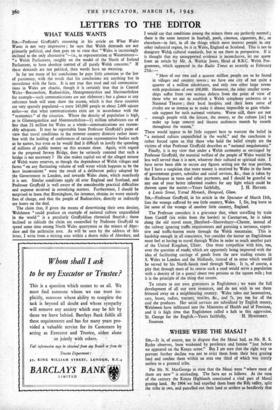LETTERS TO THE EDITOR
WHAT WALES WANTS
Sm,—Professor Gruffydd's reasoning in his article on What Wales Wants is not very impressive ; he says that Welsh demands are not primarily political, and then goes on to state that " Wales is increasingly inclined to the only alternative "—i.e., to representation at Westminster- " a Welsh Parliament, roughly on the model of the North of Ireland Parliament, to have absolute control of all purely Welsh concerns." If these demands are not political, then words have no meaning.
In far too many of his conclusions he pays little attention to the law of parsimony, with the result that his conclusions are anything but in accordance with the facts. It is not true that road and rail communica- tions in Wales are chaotic, though it is certainly true that in Central Wales—Breconshire, Radnorshire, Montgomeryshire and Merionethshire for example—such communications are not elaborate ; but a glance at any reference book will soon show the reason, which is that these counties are very sparsely populated—a mere 143,000 people to about 2,600 square miles—so that what communications exist are in accordance with the " economics " of the situation. Where the density of population is high, as in Glamorganshire and Monmouthshire—l} million inhabitants out of less than 2i million for Wales as a whole—communications are reason- ably adequate. It may be regrettable from Professor Gruffydd's point of view that travel conditions in the remoter country districts rather inter- fere with the holding of conferences of certain representative bodies such as he names, but even so he would find it difficult to justify the spending of millions of public money on this account alone. Again, with regard to the proposed Severn Bridge, does he seriously contend that such a bridge is not necessary ? He also makes capital out of the alleged misuse of Welsh water reserves, as though the dependence of Welsh villages and farms " on any fluctuating volume of well water which happens to be the least inconvenient " were the result of a deliberate policy adopted by the Government in London, and towards Wales alone, which manifestly it is not. Similar. conditions apply all over England and Scotland, and Professor Gruffydd is well aware of the considerable practical difficulties and expense involved in remedying matters. Furthermore, I should be surprised to learn that Birmingham, for instance, obtains its water entirely free of charge, and that the people of Radnorshire, directly or indirectly are losers on the deal.
The claim that, if given the means of determining their own destiny, Welshmen " could produce an example of national culture unparalleled In the world " is a peculiarly Gruffyddian rhetorical flourish ; those inclined to ridicule the claim are counselled by Professor Gruffydd to spend some time among North Wales quarrymen or the miners of Aber- dare and the anthracite area. As will be seen by the address of this letter, I write from a mining area within a dozen miles of Aberdare, and I would say that conditions among the miners there are perfectly normal ; there is the same interest in football, pools, cinemas, cigarettes, &c., as elsewhere—in fact, in all the things which most interest people in any other industrial region, be it in Wales, England or Scotland. This is not to denigrate Welsh cultural standards, but to see them in perspective. If it is thought that my unsupported evidence is inconclusive, let me quote from an article by Mr. A. Watkin Jones, Head of B.B.C. Welsh Pro- grammes, which appeared in the Radio Times as recently as February 25th:— " Most of our two and a quarter million people are to be found in villages and country towns ; we have one city of not quite a quarter of a million inhabitants, and only two other large towns with populations of over 100,000. Moreover, the other smaller town- ships suffer from two serious defects from the point of view of those who set out to establish a Welsh symphony orchestra or a National Theatre ; their local loyalties and their keen sense of rivalry are so intense as to make it almost impossible to gain whole- sale support for such national ventures. Worse still, there are not enough people with the leisure, the money, or the culture [sic] to make up large concert and theatre audiences month by month throughout the season."
There would appear to be little support here to warrant the belief in " a national culture unparalleled in the world," and the conclusion is rather forced upon us that those who hold the belief simply are the victims of what Professor Gruffydd describes as " national megalomania."
Finally, it is my view that under a Welsh autonomy as envisaged by Professor Gruffydd, the material welfare of the people of Wales would be less well served than it is now, whatever their cultural or spiritual state. I have never been able to secure any figures setting out the true position, but I have a suspicion that more money is received by Wales in the form of government grants, subsidies and social services, &c., than is taken by the Exchequer in taxes and other payments, and I should be grateful to any one of your better informed readers for any light which could be






































 Previous page
Previous page